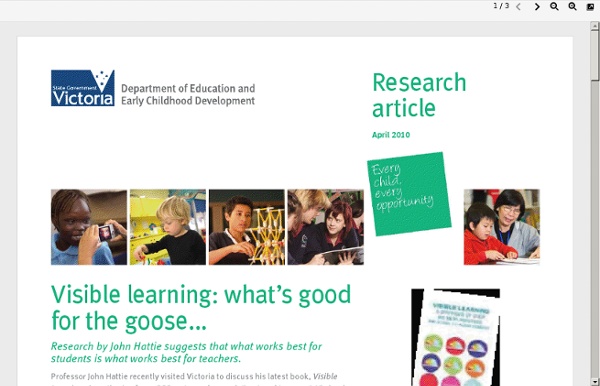



David Didau: The Learning Spy | Brain food for the thinking teacher The Science: The Growth Mindset - Mindset Works®: Student Motivation through a Growth Mindset, by Carol Dweck, Ph.D. Why the Growth Mindset? When students and educators have a growth mindset, they understand that intelligence can be developed. Students focus on improvement instead of worrying about how smart they are. They work hard to learn more and get smarter. Based on years of research by Stanford University’s Dr. Dweck, Lisa Blackwell Ph.D., and their colleagues, we know that students who learn this mindset show greater motivation in school, better grades, and higher test scores. What does a Growth Mindset School look like? Administrators support teachers’ learning. Teachers collaborate with their colleagues and instructional leaders, rather than shut their classroom doors and fly solo. Parents support their children’s learning both inside and outside the classroom. Students are enthusiastic, hard-working, persistent learners. What is the impact of Mindset? Mindsets Predict Motivation and Achievement Growth Mindset Training Boosts Motivation and Achievement
Full On Learning | Because learning is too important to be left to chance Resources Please take a look at learning resources I have produced or “acquired” (like all good teachers do!). Feel free to view, download and share – I hope they help in some way….. Constructivism Glogster posters TMHS Assessment – a poster explaining a Feed “forward” assessment strategy based on the initials of the school TMHS QR – a really simple QR poster to attract and inspire students – I’m sticking it on my door and seeing what happens! Augmented Reality (AR) Learning display posters AR Elements AR Alkali metals New Technology resources 21C Technologies Top Ten 21C Technologies checklist using ict to enhance learning QR Code resources (thanks to @nervassa for the first two resources) How to generate QR codes Find someone who can solve Making Tea QR codes Blooming Marvellous – Bloom’s Taxonomy resources (the first is from the brilliant Norbert De Mello) blooms bookmarks BloomingOrangev1[1] (from bloomsposterv4 (from Accelerated Learning Cycle
Thinking Skills What do we mean by "Thinking Skills"? Thinking skills are the mental processes that we apply when we seek to make sense of experience. Thinking skills enable us to integrate each new experience into the schema that we are constructing of "how things are". It is apparent that better thinking will help us to learn more from our experience and to make better use of our intelligence. It has always been the central aim of education to improve the quality of thinking because better thinking will not only enable us to become more successful at learning but will also equip us for life, enabling us to realise our own potential and to contribute to the development of society. Why do we need to develop thinking skills? When I was at school (in the 1950's and 1960's) students were largely considered to be "clever" if they demonstrated the ability to commit to memory huge amounts of data and to recall that data on the appropriate occasion. Is it possible to define a set of "Thinking Skills"
MindShift MindShift explores the future of learning in all its dimensions. We examine how learning is being impacted by technology, discoveries about how the brain works, poverty and inequities, social and emotional practices, assessments, digital games, design thinking and music, among many other topics. We look at how learning is evolving in the classroom and beyond.We also revisit old ideas that have come full circle in the era of the over scheduled child, such as unschooling, tinkering, playing in the woods, mindfulness, inquiry-based learning and student motivation. Contact the us by email.
Bloom’s Taxonomy: The 21st Century Version So much have been written about Bloom’s taxonomy; one click in a search engine will flood your page with hundreds of articles all of which revolve around this taxonomy. Only few are those who have tried to customize it to fit in the 21st century educational paradigm. As a fan of Bloom’s pedagogy and being a classroom practitioner, I always look for new ways to improve my learning and teaching, and honestly speaking , if you are a teacher/ educator and still do not understand Bloom’s taxonomy then you are missing out on a great educational resource. The following article is a summary and a fruit of my long painstaking research in the field of Bloom’s taxonomy. The purpose is to help teachers grow professionally and provide them with a solid informational background on how to better understand and apply Bloom’s taxonomy in classrooms in the light of the new technological advances and innovations. 1 – The cognitive : The intellectual or knowledge based domain consisted of 6 levels .